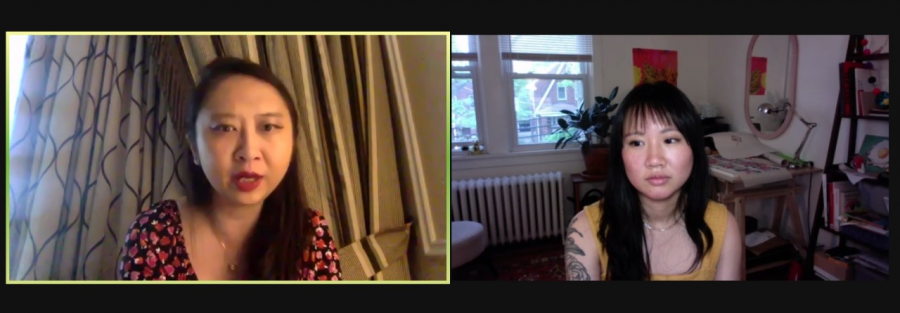Poet Sally Wen Mao closes out AAPI Heritage Month with readings from her award-winning books
Sally Wen Mao (left) is the author of “Oculus” and “Mad Honey Symposium.”
May 26, 2021
“I’ve tried so hard to erase myself…,” Sally Wen Mao began, speaking from the perspective of Asian American actress Anna May Wong. Through her poetry, Mao gave a voice to Wong that was not given to her by Hollywood in her time.
May is Asian American and Pacific Islander Heritage Month, and to celebrate this month, Pitt’s Asian Studies Center and the Global Hub hosted “Speaking Up and Out: A Poetry Reading with Sally Wen Mao.”
Sally Wen Mao is the author of “Oculus” and “Mad Honey Symposium.” Her first book, “Mad Honey Symposium,” was given the Kinereth Gensler Award in 2012. “Oculus” was published in 2019 and was named one of Time Magazine’s 100 Must-Read Books of 2019, and highly reviewed by NPR, The Washington Post and The New Yorker, among others.
Elina Zhang, who is currently pursuing her MFA in English, creative writing, had heard of and read Mao’s poetry before attending this event. She enjoyed the way Mao expresses her rage in a creative way as she writes about Asian American experiences.
“I try to go out of my way to learn about Asian American writers and Sally’s name has come up over and over again. Sally Mao spoke very eloquently about transforming rage into her creative practice. She embraces her rage without judgment,” Zhang said.
According to Merriam Webster, the word oculus has multiple meanings, including an eye, a circular or oval window and a circular opening at the top of a dome. In naming the book “Oculus,” Mao considered the implication of being able to extrapolate multiple meanings from a word.
“When I was titling this collection of poetry I was thinking about all the multiple meanings a word would have,” Mao said.
One of the characters in “Oculus,” was celebrated Hollywood actress Anna May Wong, the first Chinese American to reach international stardom. Mao felt that Wong’s story was never told and so in her book, Mao explores what Wong may have thought and said in her lifetime.
A moment that Lynn Kawaratani, assistant director of partnerships and programming at the Asian Studies Center, found notable was when Mao shared clips of Wong while reading poetry because of the use of written and visual media to tell a story.
“I loved the way she wove visual artistic expression into her poetry from the silent technicolor film clip about Anna May Wong to the drawings, words and highlighting,” Kawaratani said.
Karen Lue, the manager of Pitt’s Global Hub in Posvar Hall, said Mao’s poetry resonated with her and she enjoyed the conversations about Asian Americans that come up in her book. For these reasons, Lue felt inviting Mao as a guest was fitting for Asian American Pacific Islander Heritage Month.
“Reading her poetry, I think, really resonated for me personally, and I think a lot of other Asian Americans feel that as well,” Lue said. “Her poetry has all these different forms of Asian American media as well. She talks about Anna May Wong, and all of these things so I felt like it was kind of the perfect fit.”
Asian American Pacific Islander Heritage Month is something that was difficult to host events for in the past, according to Kawaratani, because most students leave at the end of the spring semester. But the COVID-19 pandemic opened a path into virtual programming that allowed the Pitt Global Hub to host events for the month this year.
“With the shift to online programming and students remaining partly engaged due to limited travel and summer options, we decided to offer a series of APAHM events as we had last year as well,” Kawaratani said.
Lue thinks Asian American representation is being talked about more now since the pandemic started and with this month’s events, she wanted to share Asian American voices.
“It’s been in the news more and talked about more. I think specifically, unfortunately, because of all of the rise in violence and anti-Asian violence. I think that’s what we really tried to do with 2021’s list of events. We wanted to have this theme of celebrating Asian American voices and Asian American creatives and artists,” Kawaratani said.
At the event, Mao spoke about the rise in anti-Asian hate in the last year. Mao shared a poem she wrote during the pandemic about being looked at as the “other,” as a result of racist sentiments surrounding the origin of the virus. Kawaratani felt this was an important discussion because racism towards Asians is often swept under the rug.
“Due to the complexities of systemic racism, APA people struggle with being both invisible and hypervisible at the same time. Invisible as they are often left out of the national conversation. The myth of the model minority perpetuating a level of success and therefore no struggles or issues,” Kawaratani said.
Discussions of Asian American experiences and further representation of Asian Americans in the media has just begun. Zhang believes conversations like this are important and people like Mao are necessary to share stories of Asian Americans.
“Asian American representation is just the beginning — I don’t want Asian-Americanness to feel like a phase that disappears. People like Sally give me a lot of hope that it isn’t simply a phase. It’s also about representation of a range of experiences — not simply the painful ones but the ones that are joyful and ecstatic,” Zhang said.



